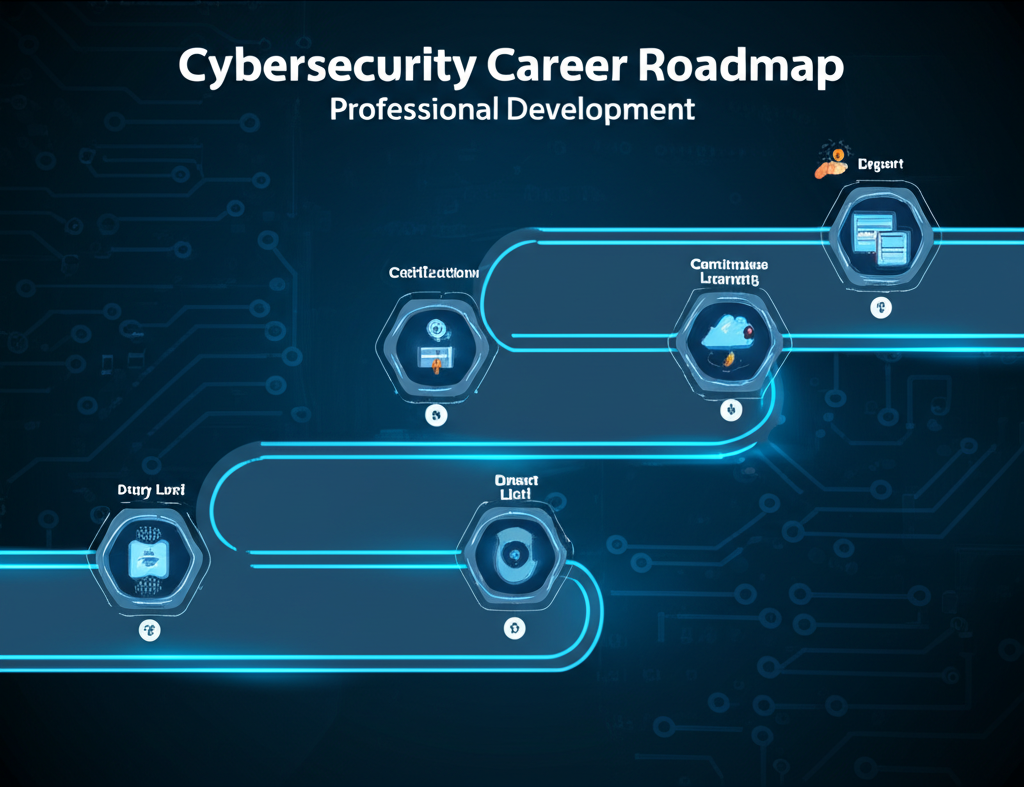
Cybersecurity Career Roadmap: From Beginner to Expert in 2025
Navigate your cybersecurity career path with this comprehensive roadmap covering essential skills, certifications, and career progression strategies for 2025 and beyond.
Het Mehta
Founder & Security Architect, 100xSecurity
Cybersecurity Career Roadmap: From Beginner to Expert in 2025
The cybersecurity field offers diverse career opportunities with strong job security and competitive salaries. This roadmap will guide you through the essential steps to build a successful cybersecurity career.
Understanding the Cybersecurity Landscape
Current Market Demand
The cybersecurity workforce gap continues to grow, with over 3.5 million unfilled positions globally. This presents unprecedented opportunities for career growth and specialization.
Key Specialization Areas
1. **Security Operations Center (SOC) Analyst**
2. **Penetration Tester / Ethical Hacker**
3. **Cloud Security Architect**
4. **Incident Response Specialist**
5. **Governance, Risk, and Compliance (GRC)**
6. **DevSecOps Engineer**
Phase 1: Foundation Building (Months 1-6)
Essential Technical Skills
# Basic networking commands every security professional should know
Network discovery
nmap -sn 192.168.1.0/24
Port scanning
nmap -sS -p 1-1000 target_ip
Service enumeration
nmap -sV -p 80,443 target_ip
Vulnerability scanning
nmap --script vuln target_ip
Core Knowledge Areas
1. **Networking Fundamentals**
- TCP/IP protocol suite
- OSI model
- Routing and switching
- Firewalls and VPNs
2. **Operating Systems**
- Windows security features
- Linux command line
- System hardening techniques
3. **Security Principles**
- CIA triad (Confidentiality, Integrity, Availability)
- Risk management
- Threat modeling
Recommended Learning Path
# Example: Simple port scanner in Python
import socket
import sys
from datetime import datetime
def scan_port(target, port):
try:
# Create socket object
sock = socket.socket(socket.AF_INET, socket.SOCK_STREAM)
sock.settimeout(1)
# Attempt connection
result = sock.connect_ex((target, port))
sock.close()
return result == 0
except socket.gaierror:
return False
def main():
target = input("Enter target IP: ")
print(f"Scanning {target} at {datetime.now()}")
common_ports = [21, 22, 23, 25, 53, 80, 110, 443, 993, 995]
for port in common_ports:
if scan_port(target, port):
print(f"Port {port}: Open")
else:
print(f"Port {port}: Closed")
if __name__ == "__main__":
main()
Phase 2: Skill Development (Months 6-18)
Hands-on Experience
Set up a home lab environment:
# Docker compose for security lab
version: '3.8'
services:
kali:
image: kalilinux/kali-rolling
container_name: kali_lab
volumes:
- ./tools:/tools
networks:
- lab_network
metasploitable:
image: tleemcjr/metasploitable2
container_name: vulnerable_target
networks:
- lab_network
dvwa:
image: vulnerables/web-dvwa
container_name: dvwa
ports:
- "8080:80"
networks:
- lab_network
networks:
lab_network:
driver: bridge
Certification Roadmap
Entry Level:
- CompTIA Security+
- CompTIA Network+
- (ISC)² Systems Security Certified Practitioner (SSCP)
Intermediate:
- Certified Ethical Hacker (CEH)
- CompTIA CySA+
- GIAC Security Essentials (GSEC)
Advanced:
- Certified Information Systems Security Professional (CISSP)
- Certified Information Security Manager (CISM)
- GIAC certifications (specialized)
Phase 3: Specialization (Months 18-36)
Choose Your Path
#### SOC Analyst Track
# SIEM query examples (Splunk SPL)
Detect failed login attempts
index=security sourcetype=windows_security EventCode=4625
| stats count by src_ip, user
| where count > 5
Monitor for privilege escalation
index=security sourcetype=linux_audit type=USER_CMD
| search cmd="sudo*" OR cmd="su*"
| stats count by user, cmd
#### Penetration Tester Track
# Example: SQL injection detection script
import requests
import sys
def test_sql_injection(url, param):
payloads = [
"' OR '1'='1",
"' UNION SELECT NULL--",
"'; DROP TABLE users--"
]
for payload in payloads:
data = {param: payload}
response = requests.post(url, data=data)
if "error" in response.text.lower() or "sql" in response.text.lower():
print(f"Potential SQL injection found with payload: {payload}")
return True
return False
Usage
if __name__ == "__main__":
url = "http://example.com/login"
param = "username"
test_sql_injection(url, param)
Building Professional Network
1. **Join Professional Organizations**
- (ISC)² chapters
- ISACA local groups
- OWASP chapters
- DEF CON groups
2. **Attend Conferences**
- RSA Conference
- Black Hat / DEF CON
- BSides events
- Local security meetups
Phase 4: Leadership and Expertise (3+ Years)
Advanced Skills Development
1. **Strategic Thinking**
- Risk assessment and management
- Security program development
- Budget planning and resource allocation
2. **Communication Skills**
- Executive reporting
- Technical writing
- Public speaking
3. **Team Leadership**
- Mentoring junior staff
- Project management
- Cross-functional collaboration
Continuous Learning
## Annual Learning GoalsTechnical Skills
- [ ] New programming language (Go, Rust, etc.)
- [ ] Cloud platform certification (AWS, Azure, GCP)
- [ ] Emerging technology (AI/ML security, IoT security)
Soft Skills
- [ ] Leadership training
- [ ] Communication workshops
- [ ] Industry conference presentations
Certifications
- [ ] Maintain existing certifications
- [ ] Pursue advanced specialization
- [ ] Consider management-focused certifications
Salary Expectations and Career Progression
Entry Level (0-2 years)
- **SOC Analyst I**: $45,000 - $65,000
- **Junior Security Analyst**: $50,000 - $70,000
- **IT Security Specialist**: $55,000 - $75,000
Mid-Level (2-5 years)
- **SOC Analyst II/III**: $65,000 - $95,000
- **Security Engineer**: $80,000 - $120,000
- **Penetration Tester**: $85,000 - $130,000
Senior Level (5+ years)
- **Security Architect**: $120,000 - $180,000
- **Security Manager**: $130,000 - $200,000
- **CISO**: $200,000 - $400,000+
Common Career Pitfalls to Avoid
1. **Certification Without Experience** - Balance theory with hands-on practice
2. **Narrow Specialization Too Early** - Build broad foundation first
3. **Neglecting Soft Skills** - Technical skills alone aren't sufficient
4. **Not Staying Current** - Technology evolves rapidly
5. **Ignoring Business Context** - Understand how security supports business goals
Conclusion
A successful cybersecurity career requires continuous learning, practical experience, and strategic career planning. Focus on building strong fundamentals, gaining hands-on experience, and developing both technical and soft skills.
Remember: The cybersecurity field rewards those who are curious, persistent, and committed to lifelong learning. Your journey may not be linear, but with dedication and the right roadmap, you can build a rewarding and impactful career protecting organizations from cyber threats.